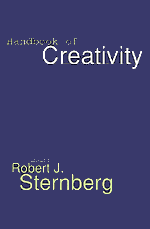Book contents
- Frontmatter
- Contents
- List of Contributors
- Preface
- Handbook of Creativity
- PART I INTRODUCTION
- PART II METHODS FOR STUDYING CREATIVITY
- PART III ORIGINS OF CREATIVITY
- PART IV CREATIVITY, THE SELF, AND THE ENVIRONMENT
- 10 Creative Cognition
- 11 From Case Studies to Robust Generalizations: An Approach to the Study of Creativity
- 12 Creativity and Knowledge: A Challenge to Theories
- 13 Creativity and Intelligence
- 14 The Influence of Personality on Artistic and Scientific Creativity
- 15 Motivation and Creativity
- 16 Implications of a Systems Perspective for the Study of Creativity
- PART V SPECIAL TOPICS IN CREATIVITY
- PART VI CONCLUSION
- Author Index
- Subject Index
16 - Implications of a Systems Perspective for the Study of Creativity
Published online by Cambridge University Press: 05 June 2014
- Frontmatter
- Contents
- List of Contributors
- Preface
- Handbook of Creativity
- PART I INTRODUCTION
- PART II METHODS FOR STUDYING CREATIVITY
- PART III ORIGINS OF CREATIVITY
- PART IV CREATIVITY, THE SELF, AND THE ENVIRONMENT
- 10 Creative Cognition
- 11 From Case Studies to Robust Generalizations: An Approach to the Study of Creativity
- 12 Creativity and Knowledge: A Challenge to Theories
- 13 Creativity and Intelligence
- 14 The Influence of Personality on Artistic and Scientific Creativity
- 15 Motivation and Creativity
- 16 Implications of a Systems Perspective for the Study of Creativity
- PART V SPECIAL TOPICS IN CREATIVITY
- PART VI CONCLUSION
- Author Index
- Subject Index
Summary
Psychologists tend to see creativity exclusively as a mental process. In this chapter, I will propose that such an approach cannot do justice to the phenomenon of creativity, which is as much a cultural and social as it is a psychological event. To develop this perspective, I will use a “systems” model of the creative process that takes into account its essential features.
Creativity research in recent years has been increasingly informed by a systems perspective. Starting with the observations of Morris Stein (1953, 1963) and the extensive data presented by Dean Simonton (1988, 1990) showing the influence of economic, political, and social events on the rates of creative production, it has become increasingly clear that variables external to the individual must be taken into account if one wishes to explain why, when, and where new ideas or products arise from and become established in a culture (Gruber, 1988; Harrington, 1990). Magyari-Beck (1988) has gone so far as to suggest that because of its complexity, creativity needs a new discipline of “creatology” in order to be thoroughly understood.
The systems approach developed here has been described before and applied to historical and anecdotal examples, as well as to data collected to answer a variety of different questions (Csikszentmihalyi, 1988b, 1990, 1996; Csikszentmihalyi, Rathunde, & Whalen, 1993; Csikszentmihalyi & Sawyer, 1995; Feldman, Csikszentmihalyi, & Gardner, 1994).
Information
- Type
- Chapter
- Information
- Handbook of Creativity , pp. 313 - 336Publisher: Cambridge University PressPrint publication year: 1998
Accessibility standard: Unknown
Why this information is here
This section outlines the accessibility features of this content - including support for screen readers, full keyboard navigation and high-contrast display options. This may not be relevant for you.Accessibility Information
- 166
- Cited by
